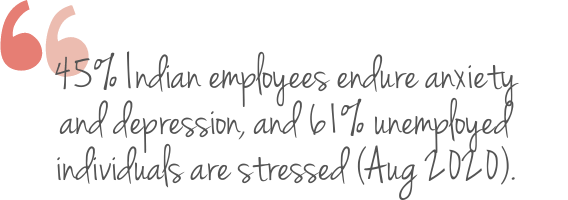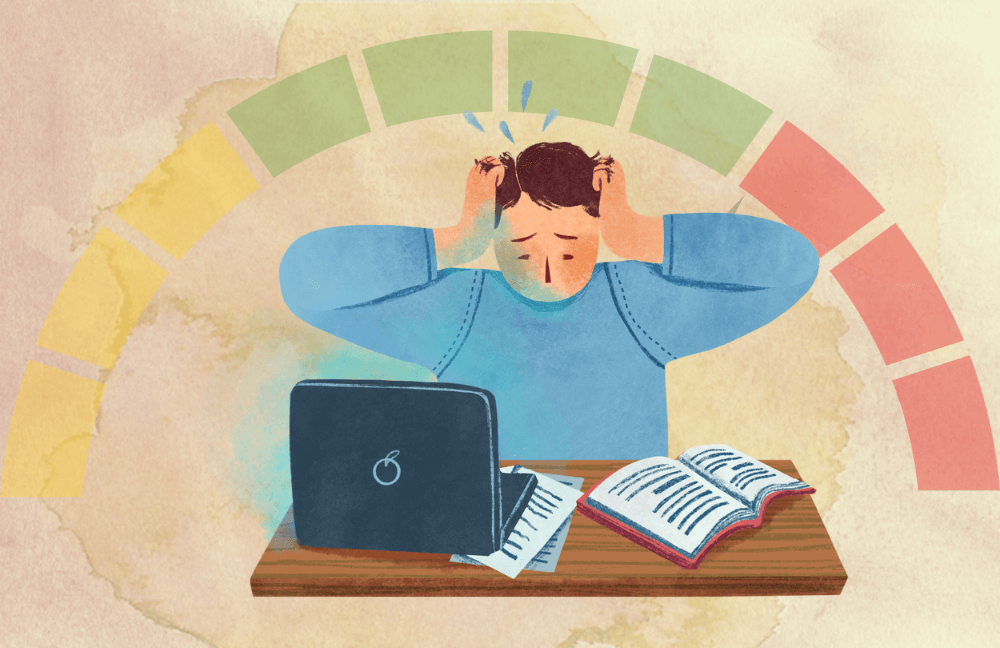Workplace Wellness Concept
Workplace Psychological Wellness
It is progressively being accepted that psychological wellness at the workplace is a crucial determinant of health. Poor mental health and stress at work initiate and worsen lifestyle disorders like smoking, drinking, hypertension, high cholesterol, obesity, diabetes, and cardiovascular conditions, amongst others.
People spend a third (or not uncommonly these days, half or more) of their living day at work. While work is a means to earning a living, it involves emotional exchange too. And if the emotional climate is stormy, the negative cascade ensues. Besides contributing to lifestyle disorders, poor mental health at work leads to career dissatisfaction, frustration while working, lack of motivation, poor team dynamics, and burn-out, seriously affecting an employee’s ability to contribute meaningfully in their personal as well as professional lives.

Workplace Happiness: Do Employers Care?
According to the Journal of Labor, happy employees are nearly 12% more productive than unhappy workers. They enjoy holistic health, have smooth professional and personal relationships, and prove to be more beneficial for the organization. Happier workplaces raise sales by 37%, productivity by 31% and overall wellness by 45%. Contrastingly, unhappy employees don’t enjoy doing tasks assigned to them, can’t gel well with co-workers, and somehow never seem content with financial rewards or incentives either. They sense disrespect and discouragement, and hence seek lesser meaning in the work they do. So, they obviously cannot, and do not feel motivated to do it well. Employers should care about this.
Workplace Stress: A Problem for Employees?
Stress is a sweltering problem in the corporate sector, especially so in India. And even though we all know that stress is simply a maladaptive response to unwanted change, its effects are sketchier than we perceive. Internalized conflict can manifest as heart disease, back pain, headaches, gastrointestinal problems and other psychosomatic concerns. Stress is a predecessor to distractibility, inattention, low self-esteem, indecisiveness, anxiety and depression, all of which are anyways not discussed openly at work.
Nobody wants to talk about how they feel, because they fear they will be reprimanded for speaking up or might lose their job for expressing. But ignoring the problem is not making it go away. The elephant is sitting in the room and is raising the incidence of stress and mental health disorders among workers. Obviously, this isn’t helping performance. Workplace stress has become an anomalous norm.
Workplace Stress: A Problem for Employers?
From an employer standpoint, stressed employees disrupt the status quo with added physical illness, poor productivity, enhanced human error and frequent accidents. Pooled together, all of these heighten sickness absence, medical expenses, and staff turnover.
In some countries 30–40% of sickness absence at work has been attributable to psychological disturbances. Emotional problems hence, have an unswerving impact on business. Also, a climate of negativity, discontentment and pressure lowers employee morale. People dislike coming to work or working, because it simply doesn’t enrich them; rather it takes away from them. It’s an unequal and unwanted equation to be stuck in. And so, employers are not happy from multiple standpoints – ethical and business both.
Can Anyone Do Anything About Stress?
Assisting Managers
Assisting Employees
MindFrames ‘E’ Strategy for Workplace Wellness
Enlighten
Employees could be oblivious to emotional wellness, as well as mental illness. They need open and continuing exchanges to decrease the ignorance and stigma surrounding mental health. The sooner these conversations start, better will be the wellness climate in offices and personal life. Psychological well-being quizzes, surveys, suggestions and announcements for all classes of employees, are a good way to encourage discussion, and enlighten them about emotional and behavioral issues.
Educate
Happiness, motivation and peace, are assumed to be innate traits. We take professional courses to excel in engineering, design, science, art or math. But nobody trains to identify and respond to emotional turmoil. Managers have the add-on role of caregivers in the workplace and may feel ill-informed or under prepared to handle crisis in employees and teams. This can be offered to managers and employees through videos, audios, discussions, presentations, mailers and more.
Enrich
Superior organizations are so, because of inspiring leaders. Hence enriching their mental health is important. If managers experience stress, it negatively impacts employees’ interpersonal adjustment and work performance. This is true because managers react to employees’ deliverables as well as their emotional concerns based on their own mood. Stress assessment, mood management, mentoring, mindfulness training and relaxation techniques can enrich the work environment.
Empower
Employees may not always be blessed sufficiently with skills to combat emotional conflict. They can be empowered through a series of evidence-based tools prepared by experts in the field. These include but are not limited to relaxation audios and techniques, art therapy ideas, cognitive therapy protocols, emotive self-analysis, mindfulness, and other out of the box modalities that empower them to overcome psychological and emotional challenges with ease.
Dr Shefali Batra has created diverse tools for emotional wellness evaluation, relaxation as well as mindfulness, all of which can be customized to preference in corporate wellness initiatives. All programs are customized, with flexibility in frequency, duration of workshops, analysis, assessment, educational material, and more. We are eager to help you help your employees and teams. Please connect with us. We’re eager to make a difference.




References
- Goetzel, R. Z., Roemer, E. C., et al., (2018). Mental Health in the Workplace: A Call to Action Proceedings From the Mental Health in the Workplace-Public Health Summit. Journal of occupational and environmental medicine, 60(4), 322–330.
- Carolan, S., Harris, P. R., & Cavanagh, K. (2017). Improving Employee Well-Being and Effectiveness: Systematic Review and Meta-Analysis of Web-Based Psychological Interventions Delivered in the Workplace. Journal of medical Internet research, 19(7), e271.
- Rajgopal T. (2010). Mental well-being at the workplace. Indian journal of occupational and environmental medicine, 14(3), 63–65.
Latest Posts

7 Reasons Why You Should Seek Therapy

5 Time Wasters You Need to Overcome

5 Signs you have no work life balance

Work and Life: What is the right balance?


